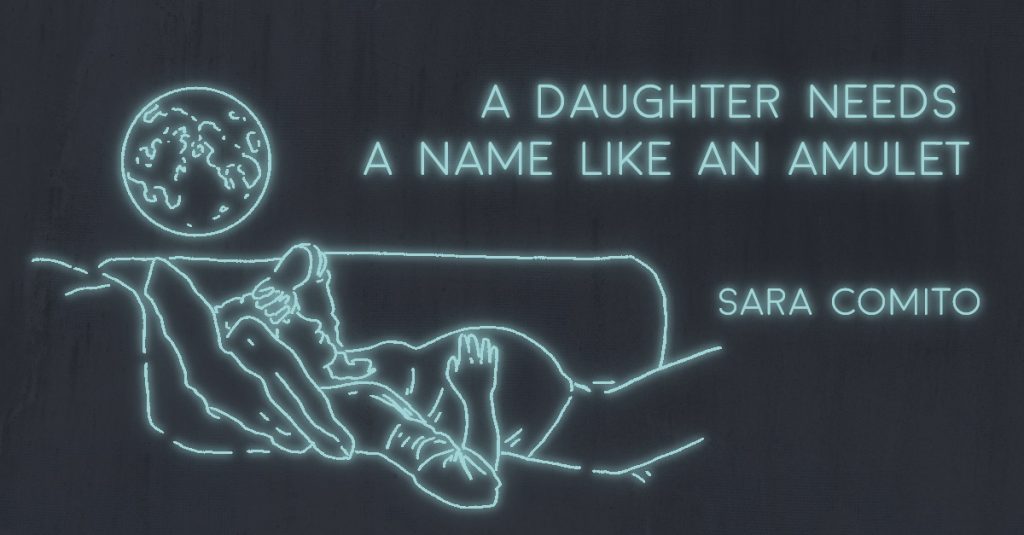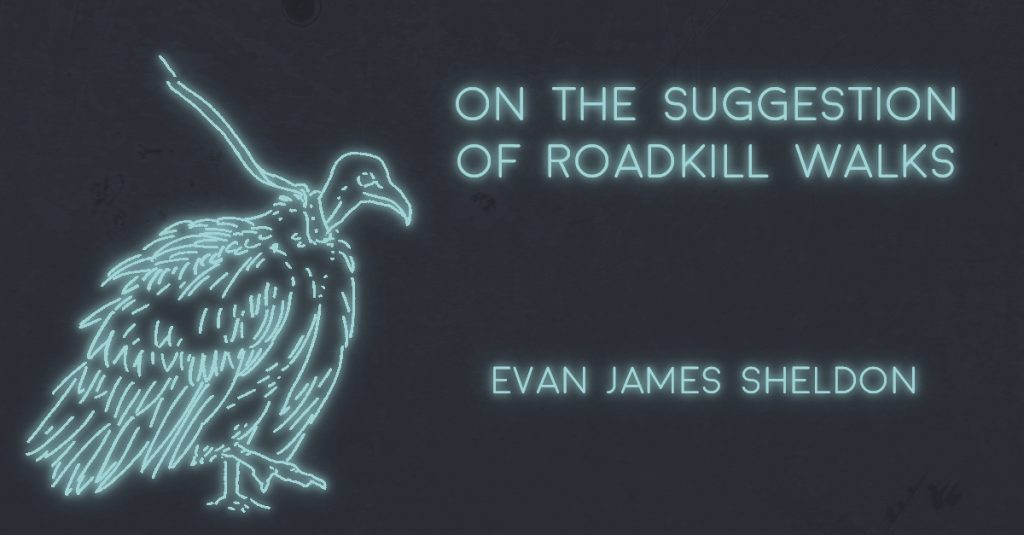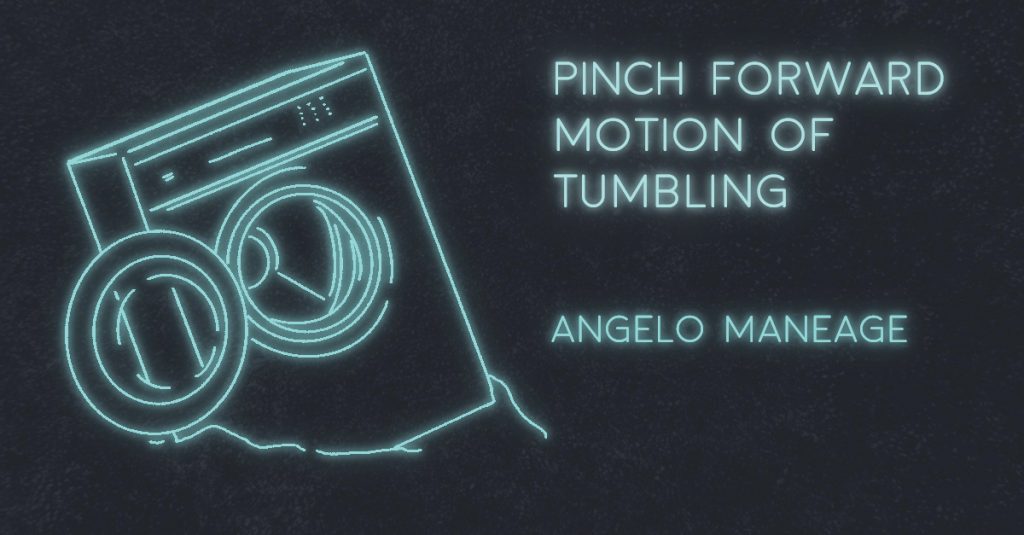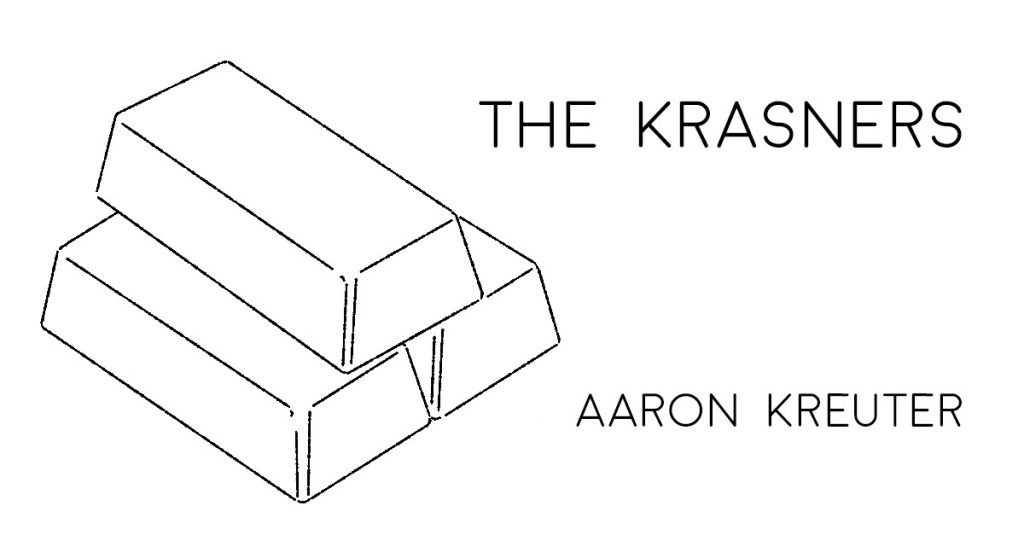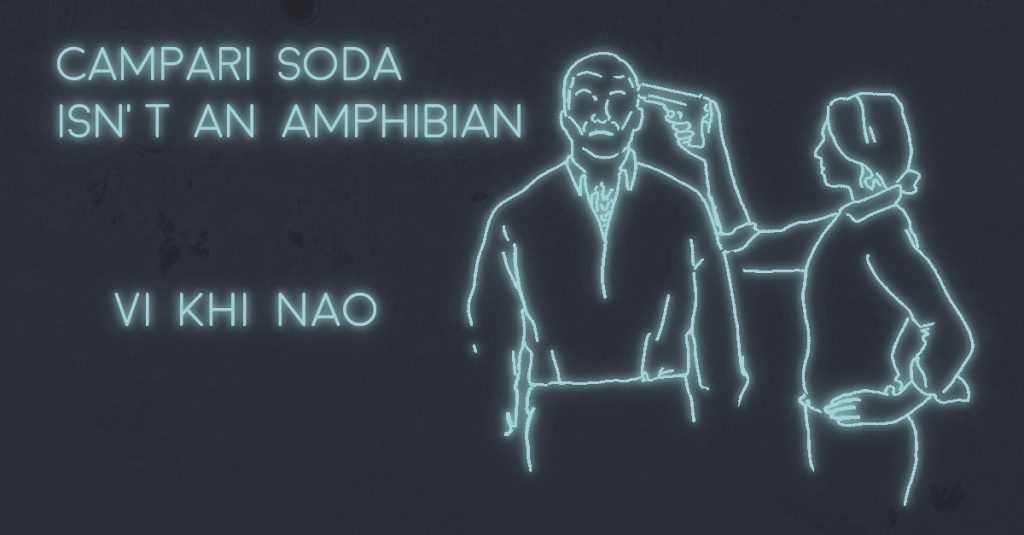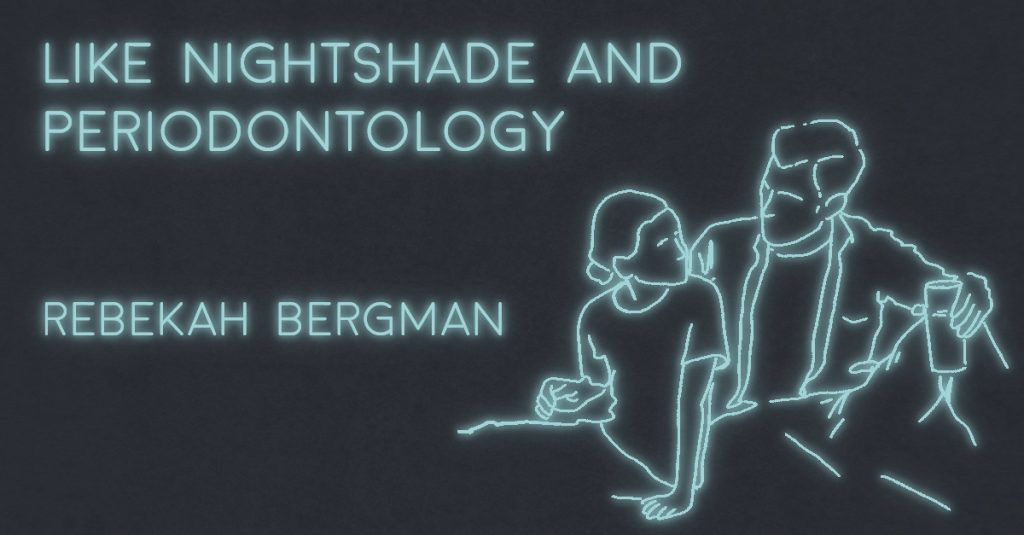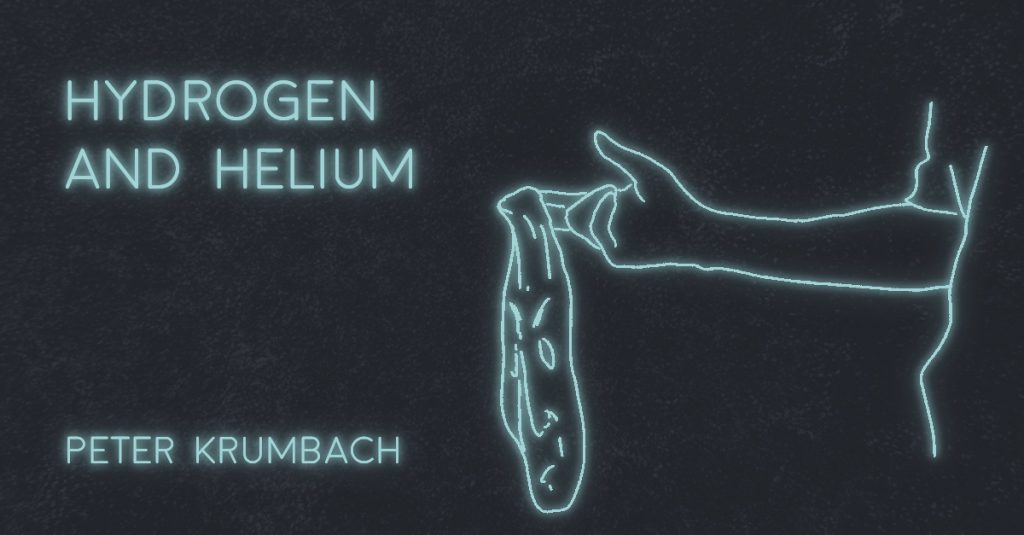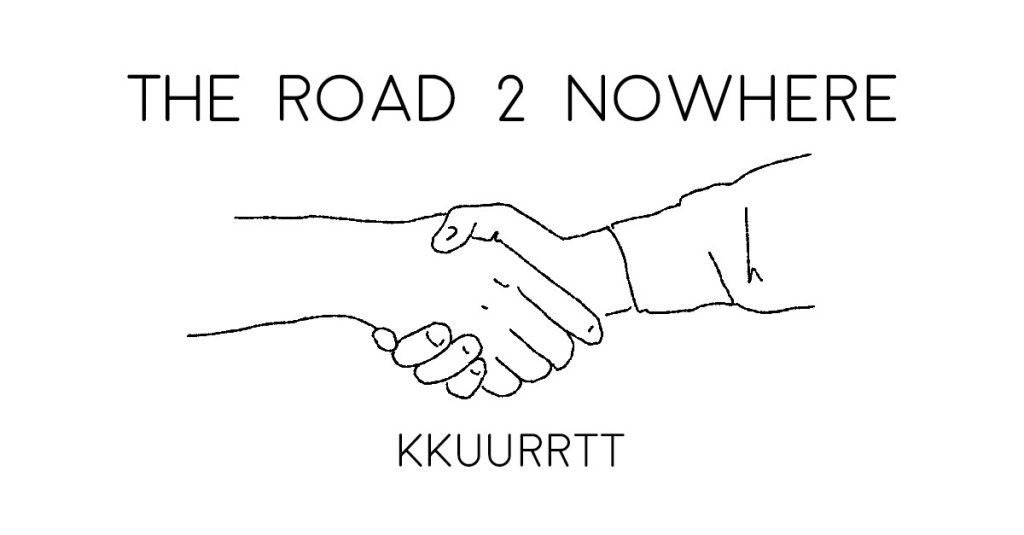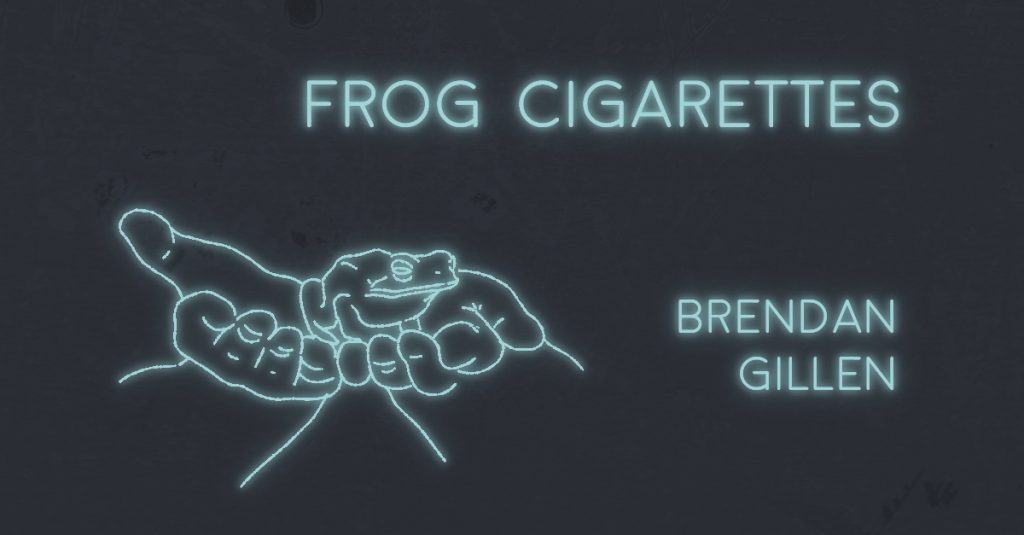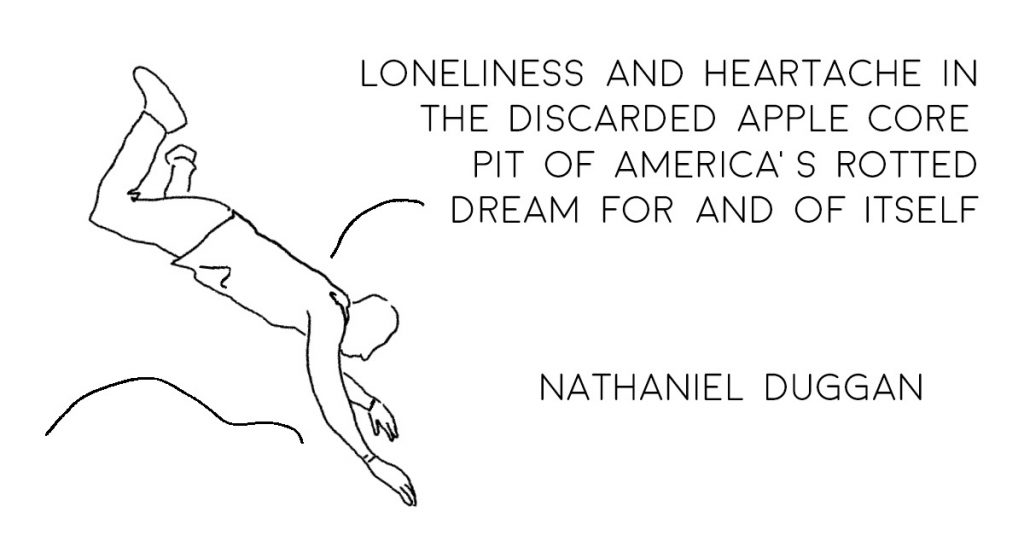
LONELINESS AND HEARTACHE IN THE DISCARDED APPLE CORE PIT OF AMERICA’S ROTTED DREAM FOR AND OF ITSELF by Nathaniel Duggan
Lately Frank has been feeling especially Frank-like, his days reduced to the potato chip crumbs he has failed to brush from his lap—as if he, the essence of himself, is a shirt that can be slipped on or off and has been worn perhaps a few too many weeks in a row. He wets the bed more than when he was a child, although back then his piss was hot and searing as shame, whereas now it is simply cold as a metal unexpectedly touched. His sweat, too, is cold. His dreams are muggy as incest, bratty stepsiblings fucked. He works at a deli sandwich shop, his shifts spent fondling various meats through disposable plastic. He is 32-years old and having trouble, lately, imagining what will fill all the years left ahead of him.
On his days off, Frank visits his mother. At one point Frank had friends; then, suddenly, as if through a magician’s whirling trick of smoke and exploding pigeons, he woke and did not have friends. They had vanished. They had slipped into the cracks of better lives, found secret passageways hidden behind their medicine cabinets into mortgages and tropical island vacations and jobs with business suits, places thoroughly and utterly inaccessible to the Franks of the world.
“Maybe you could try grad school,” his mother suggests over lunch. “You always did so well in school. Or what about teaching English overseas? Plenty of young people are teaching English overseas these days, they’re saying.”
“You always do this,” Frank says. “This is all we ever talk about. Can’t we ever talk about anything else?”
“You were just always so good in school,” his mother says.
The previous day, Frank remembers, he fucked up a wrap at work. The wrap had folded wrong, split against the bend of itself, crumbled and unspooled. He’d looked at his coworker, Kyle, in mock-shock. “How do you fuck up a wrap,” he said.
Kyle was in his early twenties and attending community college, acne still surging like meteor showers across his face. He was grinning.
“Yes you did,” Kyle said. “You sure did fuck that one up. But hey, there’re children starving in Africa, there are tiny babies without food or homes or mothers, and one fucked up wrap doesn’t matter in the grand scheme of their suffering.”
In response, Frank slam-dunked the wrap into the trash can. Across the service counter, customers were watching. Frank felt strange and unreal, felt almost, as if in a video game, unbeatable—like there were forces trying to defeat him and they could not.
That kind of thing happened sometimes, he knew. In certain moments, a hatch opened in your brain, and you crawled up and out through it to escape the piloted machine of yourself, got far enough from your own way of seeing that your life became as unrecognizable to you as a telescoped planet, and for a moment, then, even beneath the insect-splotched lightbulbs of your workplace, everything kind of glimmered like it was covered in fresh dew.
Of course, like anything else those flashes ended. The customers coughed impatiently. Kyle shuffled his feet and suggested they get back to work, he and Frank. You were just you, after all. There was no way, as of yet—as discovered and postulated by scientists, by physicists in nuclear basements and engineers pale-faced by the rays of computer screens stared into late at night—to be anyone else. So Frank made the wrap. Although really he did not want to make the wrap. He wanted instead to talk about how those children overseas were only starving because of American bombs and governmental policy destabilizing their infrastructure.
“You were always so good in school,” his mother says again in the dining room, her voice a sigh. as faint now as a tapping on a windowpane.
Although it’s bright summer, all the lights in the house are on, making the space look cold and drained of the day. They finish the meal in silence. Afterwards, his mother excuses herself to the bathroom. Frank hears her run the shower and then, muffled by the water, quietly scream.
Frank gets in his car and does a few laps around the neighborhood. He is not drunk but he feels the dilation of drunkenness, as if there are air bubbles moving in his bloodstream. This is the suburb where he grew up, adjacent to the city where his current apartment is. It occurs to him he has not made it very far outside of his life, the neatly cropped and segmented lawn of it. When he returns to his mother’s house, all the lights are off, and he finds her asleep on the living room couch, sprawled and open-mouthed as a child.
***
After a lunchtime rush, Frank asks Kyle, “So what’s up this weekend? Any parties?”
He means it as a joke. He has always assumed that Kyle, still living with his parents, returns home to play video games after each shift. To his surprise, Kyle freezes at this question, the color draining from his face.
“I mean,” Kyle says. “Well, it wouldn’t really be your kind of scene. Kind of a different crowd. I mean, younger. No offense, dude.”
On Frank’s smoking break, the clouds roil apocalyptically in the sky above. He tries to light his cigarette with a dramatic flourish, like it’s the last cigarette he’ll smoke before the ash-black end of the world. He thinks about a boy he kissed at a New Year’s party five years ago who he hasn’t seen or spoken to since.
“We just had such a connection,” he says when he steps back into the kitchen.
“Wait,” Kyle says. “This isn’t about what’s-his-name, is it?”
“Brian,” Frank says. “We just really kicked it off. We had such a spark.”
“Jesus,” Kyle says. “We’re not really talking about this for the thousandth time again this week, are we? Didn’t that happen like, a century ago? Just let it go, man. Please let’s not talk about this again.”
When Frank gets back to his apartment, he doesn’t turn on any lights. He eats a prepared supermarket meal by the orange glow a streetlamp tosses against his bedroom wall and drinks half a beer. Teaching overseas…He imagines himself copy and pasted, a file moved but otherwise unmodified, into China, South Korea. In the scene he is in a classroom and the students around him are faceless. He himself in the scene is faceless—actually, he is censored out, a digital conglomeration of squares. After his lessons he would probably go back to an apartment no bigger than the one he currently occupies, eat a prepared supermarket meal, and drink half a beer. The thought makes him feel bereft of hope, like in the second act of a summer blockbuster where aliens have invaded the earth and toppled the government—the part where the heroes lose and fog shrouds the horizon. Faceless Frank. The problem with leaving for anywhere else, he suspects, pulling the covers over his head, is that he would have to go there with himself.
***
And so for a while, for a couple several years and decades, Frank feels formless. He feels like a cookie cutter shape, its limits defined and rigid, but its details bludgeoned, the features misshapen as blurs. He gets enraged every now and again at his mother. For what reason, after all, did she have to create him? To force him pink and vulnerable into the cruelty that is the world? He feels often and especially like a supervillain abomination, like a—ha ha—a Frankenstein, and when he visits her, he screams and shatters her plates. He still works for minimum wage wrapping sandwiches. He is 36, and then he is 47. Kyle has long since quit, graduated with his college degree and gone off somewhere probably to teach English overseas. Frank himself has begun to drink at an admittedly destructive rate, although he does this in a subtle, calculated way that doesn’t feel so much like blatant annihilation of the self but rather quiet sabotage, trapdoors and tripwires laced intricately throughout his heart. He feels, now, like he is a spy in the country of himself, engaging in acts of treason, and so appropriately one morning he calls his ex-boyfriend Adam.
They decide to meet on the beach. It is late fall. They lay out their towels and then lay on top of their towels, side by side.
“That gull keeps circling me,” Adam says. “Are you seeing this? Maybe it thinks I’m dead. That I’m a carcass. A corpse.”
“Jesus,” Frank says. “You never change. Everything’s always about you, isn’t it?”
There are leaves scattered about the beach, autumn red, like so many cooked crabs spilled. Seagulls keep pinwheeling overhead. The ocean sounds the way the inside of an empty shell sounds. The weather is cloudy, and it’s one of those days where you cannot tell if it is a buoy washing ashore or a headless, half-eaten seal.
Afterwards they get a hotel. Adam turns on the television. There is a rerun of “Shark Week” playing. “Shark Week” is a TV series produced annually that, for an entire week, dedicates itself to shark-based content—divers getting into deep-sea cages with sharks, lifeguards interviewed regarding shark-based deaths on their beaches, entomological investigations into the history of sharks and the possible existence of super sharks, ancient and lurking things at the bottom of the ocean the size of sunken ships.
Frank is realizing sex will probably not happen tonight.
This is, simply, not a situation in which sex between two people can occur.
Shark Week keeps playing, a rerun of a rerun’s idea of itself. Frank and Adam fall asleep together fully clothed, and the next day after leaving the hotel they do not talk ever again.
Later a decision will be made by ad agencies and corporate lawyers to transform “Shark Week” into “Shark Month.” And after this proves a rousing success, they will extend it even further, until there are entire Shark-themed calendar years, and before you know it your very life has become a Shark Week rerun regurgitated and interrupted regularly by commercials.
That night as Frank fell asleep against Adam’s warmth, he dreamed of a room black with mirrors—every inch of it paneled with glass such that the light inside bounced continually and endlessly until its expiration, leaving nothing then but darkness. Although he could not see, Frank was aware of his reflection in the mirrors, multiplied a million times over. He could sense it there moving in all that glass like a hole in the back of his head, a hole the size of the moon—no. A hole the size of the disappearance of the moon.
***
One Friday Frank goes to the bar alone.
No one there talks to him, and he does not talk to anyone.
He spends several nights in a row eating fast food in his car in empty supermarket parking lots.
Late November a centipede scuttles down his neck.
Somewhere a terrorist whispers the word “galvanize” in a Wendy’s before ordering chili cheese fries.
Overall love is renounced across the globe, as is life, death, inner city bus drivers.
Various presidents and prime ministers acknowledge in hastily assembled press releases that nothing will ever happen to anyone ever again.
People are a bit perplexed by this—should they feel secured or doomed?
More worrying, they realize: can they even still tell the difference?
Each day sheds the skin of itself and slithers into the next. On interstates everywhere rodents dart in front of roaring 18-wheelers. The chipmunks have grown crazed and carnivorous, caught—on camera!—gnawing one another’s bones. Fathers are blamed for America. Founding, suburban, whatever, it is the father’s fault, whether he was absent or perhaps so present his touch reaches across the span of centuries to tangle each life and word and thought of his great-great-grandchildren like puppet string. And so a feeling of doom pervades and closes each day. Schoolteachers drive to little league baseball fields late at night and shoot their brains out atop dusty mounds that seem almost Martian in the moonlight. The stock market, meanwhile, does pretty well.
Frank tells his doctor, “I feel displaced and without purpose. I am utterly depressed. I know I have a drinking problem, but the problem is not the drinking, the problem is what causes the drinking, the problem drinks itself dry, it is an abscess, I feel it as a scabbed drought on the back of my skull where fluid cannot help but lump and end in an aneurysm because it is a lack that must be filled, because nothing always wants something. In this sense, the symptom is the same as the cure.”
“Yes,” the doctor says, hands stuffed deep into Frank’s mouth. “OK. Frank, you know I’m a dentist. Have you thought about seeing a professional regarding this?”
Frank is 54-years old, driving to his mother’s house.
They argue over salad.
Frank is intrigued to find himself so self-righteous while so full of greens. The same mouth spitting acid at his mother is chewing vegetation, mincing arugula into mushed bits—what could be less threatening than grazing on grass? Yet she gets so small when he attacks her. To Frank her retreat is contemptible, her face crumpling in on itself like a beer can’s crushing, even her wrinkles wrinkled, sad eyes lost in folded decades of skin. But he knows, when he goes outside to smoke a cigarette, that he cannot blame her—she is only trying to help. He should not be so hard on her. Sometimes it is necessary to shrink yourself, he understands. Sometimes, confronted with the vast, metropolitan sprawl of life and its disappointments, you have to reduce yourself to your smallest unit, to slip rodent-like through the cracks and avoid all that gargantuan existential nonsense, those questions, asteroid-sized and incoming, Why am I here, Where am I going, and What am I going to make for dinner?
***
Life becomes a four-walled thing for Frank, always closing in, a phone ringing at midnight and an unfamiliar voice asking, “Is your refrigerator running?” He is suspicious of nostalgia, the sugared deceit of it. Any moment can become nostalgic with enough refraction, any person can be yearned for if placed at a far enough distance.
His heart, the bargained yard sale of it, continues to pump. He does not find love. He is 60, his mother is dead and he has inherited her house. He sleeps each night in the guest bedroom and he washes the sheets after.
One afternoon in the supermarket he runs into Kyle. It has been, it seems, generations since he last saw Kyle. His acne is gone. His hair gleams and he is wearing a business suit and tie. He looks, Frank muses, professional—which begs the question, then, professional of what exactly, of teeth, of blue-gloved hands plunged into the gape of a mouth, of football, of politics, of sandwiches, of teaching overseas…
“Frank,” Kyle says. “Oh, hey! How have you been?”
“Kyle,” Frank says. “Not bad, man. What’re you up to these days?”
They talk for a while. Kyle has one of those jobs and is living one of those lives—“You know how it goes,” he says, and Frank does, and together they nod their heads in understanding. Kyle would like to catch up, he invites Frank to dinner. As they part ways, Frank reflects that so much happens in the supermarket, so many people loveless and wandering and checking their eggs before purchasing. The parking lot is vast as an airplane landing strip, and as he navigates it he feels the distinct melancholy that comes with a journey’s beginning or end. Where did he park again?
And then it is 1am and the leaves of the trees in his neighborhood are limned by orange streetlight and there is no moon. A moonless night: imagine, Frank thinks, to be –less, to be, in a word, without. Frankless, he thinks. He cannot sleep. He leaves the guest room and makes the walk down the hallway to his original bedroom, the one he slept in as a child. The floor creaks beneath him as if he is an intruder in his own house. The bedroom is a belly of darkness and trapped air, the lights off and the shades drawn tight, everything perfectly preserved by the stale smell of dust. He crawls into his old bed, pulls the blankets to his chin, and closes his eyes. His eyelids are shut tight but he is utterly awake. Somewhere in the house there is a window open and the breeze it lets in sounds like his mother’s soft sighing. Secure as he is beneath his sheets, he feels cast-off and drifting, like an island untethered. He feels like someone else, someone completely and thoroughly not-Frank: like an old childhood friend of himself, one of the kids he had been close to in grade school before they had moved somewhere away and irrevocably exotic, to Florida or Hawaii; a friend lost then, but coming back now, rendered strange and unknowable by so many decades apart, yet familiar as a constellation is far, returning to a place they had never properly left.

